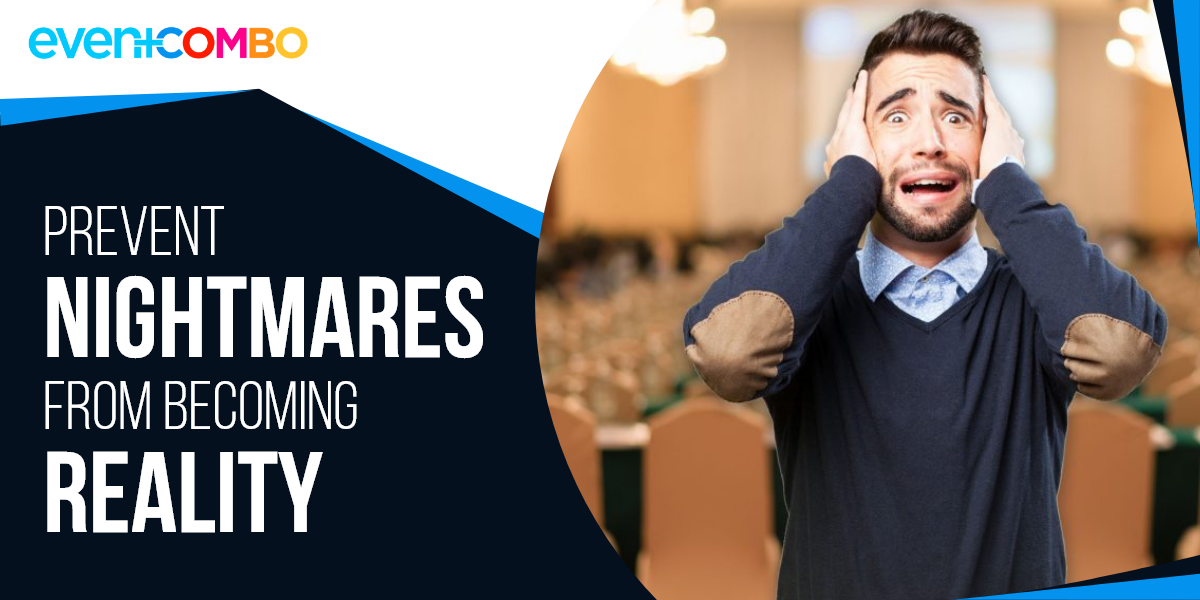

Events allow you to expand your brand's reach, build connections, and generate leads. But if not planned well, they turn into mishaps impressed into the memories of attendees. Examples of event planning disasters abound in the event management industry. They give organizers insights into how to prepare and plan meetings, conferences, or other events better.
As an event tech company, we continually hear stories about event planning mistakes made or witnessed and their consequences. Though we cannot disclose any names, we have compiled a summary of significant planning errors shared with us. Dive in to understand what could go wrong and how to effectively avoid them with foolproof planning.
Examples of Event Planning Gone Wrong
1. An event planner had scheduled a corporate conference at a convention center. He was sure that the center was ideal for conducting the conference as he had discussed everything with the venue staff beforehand. However, on the day of the event it was found that there were not enough chairs, tables, or audiovisual equipment for the expected number of attendees. Although the planner was able to organize additional seating arrangements, he could not save attendees from the impact of inadequate A/V equipment. It resulted in blurry visuals during presentations and inconsistent lighting, which distracted attendees, leading to a poor event experience.
Lesson Learnt: As an event organizer, you should leave no stone unturned to check beforehand if the venue is prepared to meet the needs of the event and the expected attendees. You should also check whether the A/V equipment is set up in advance. To ensure there are no gaps, you can use venue and facilities management software. It eases the booking and management of A/V equipment and other facilities through detailed inventory and proper tracking.
2. A corporate firm had organized a conference on digital transformation. They were sure that everything was well-organized for a strong attendee experience. However, when the keynote speaker arrived on the stage, the organizers received a call about unauthorized access from the back door. Soon after, the uninvited guest stirred chaos in the event, unsettling everyone in attendance.
Lesson Learnt: Overlooking security not only compromises the safety and well-being of attendees but also dampens the reputation of event organizers. Identify all venue entry points and make sure they are secure. Organizers must know the venue inside out to prevent security hazards and minimize event disaster impact.
3. A major fintech company was hosting an online global summit. It was a significant day as they were showcasing their latest innovations. A multitude of attendees had registered to participate in the virtual event via a popular video conferencing platform. No one could have anticipated that the platform being used to host the event would fall victim to cybercriminals. Hackers exploited a zero-day vulnerability in the software, bypassing security measures. During a live keynote by the CEO, the hackers hijacked the video stream. Attendees witnessed scrambled letters on their screens instead of the CEO's address. The company experienced considerable embarrassment and took a long time to regain its prior reputation.
Lesson Learnt: It is essential to consider cybersecurity when using event technology. You must choose a trustworthy platform with robust security features in place and stay aware of potential vulnerabilities. Also, taking adequate measures to protect attendee and event information is of utmost importance.
4. An audit firm hosted a cybersecurity conference. The event was held at a spacious convention center with ample food and drink options. There were also networking activities planned for attendees. However, due to poor marketing efforts, only 45 out of 200 registrants showed up. They had worked so hard in organizing the event but missed promoting it the right way. Low attendance rendered all their efforts futile.
Lesson Learnt: Spreading the word about your event is just as crucial as organizing it. Use social media and other channels to promote your event well so that your hard work is fruitful, and your meticulous planning can be experienced and acknowledged by your audience.
5. A large marketing conference, targeting fitness influencers, was organized by a healthcare company. Hundreds of creators had gathered in the hopes of attending workshops, panels discussions, and networking sessions. However, event organizers had planned a generic agenda consisting of lectures and presentations, assuming all attendees would be interested in them. The event failed to resonate with attendees in the absence of a unique or specialized agenda, and most of them remained passive observers. An abject lack of engagement was highly visible.
Lesson Learnt: One-size-fits-all approach is one of the common event planning mistakes. For greater engagement, organizers should plan diverse topics and themes of discussion, which can be curated after careful market study. Additionally, interactive elements like polls, Q&A sessions, or hands-on workshops can be used to facilitate better engagement and knowledge sharing.
Concluding Words
The unpredictable nature of event planning disasters underscores the importance of proactive preparedness and thorough consideration of every aspect of the planning process. By learning from examples, organizers can cultivate a mindset of caution and preparedness, empowering them to prevent and address issues effectively. Remember, vigilance and foresight are the cornerstones of successful event execution, ensuring memorable experiences for all involved.
Event planning is undeniably complex, but with the right technology, you can streamline and improve accuracy. Experience the difference: https://bit.ly/498PjBV

Networking events remain the backbone of professional growth, whether you're building a business, recruiting talent, generating leads, or seeking strategic partnerships.

RingCentral Events is a known name in the event platform space. It supports in-person, hybrid, and virtual formats, but today’s event programs need far more depth within each format.

The industry has made it clear that event management platforms must support multiple formats with consistency. This shift has led many professionals to explore vFairs alternatives that provide full event management.